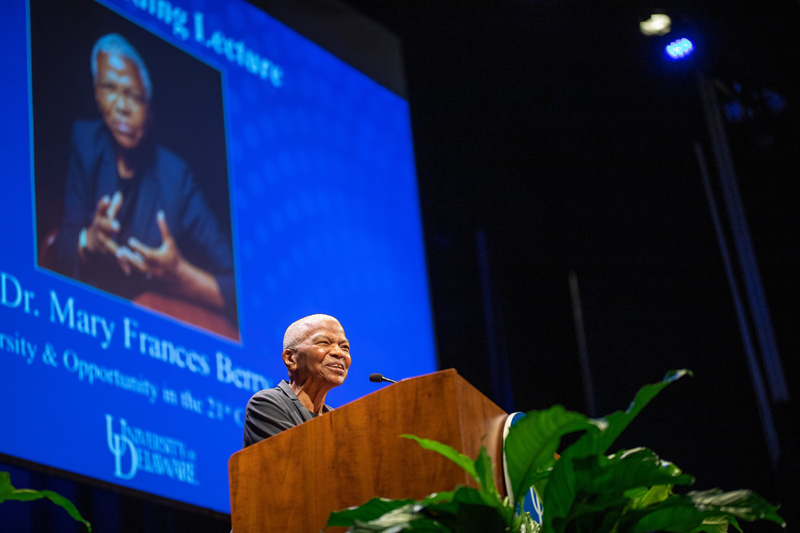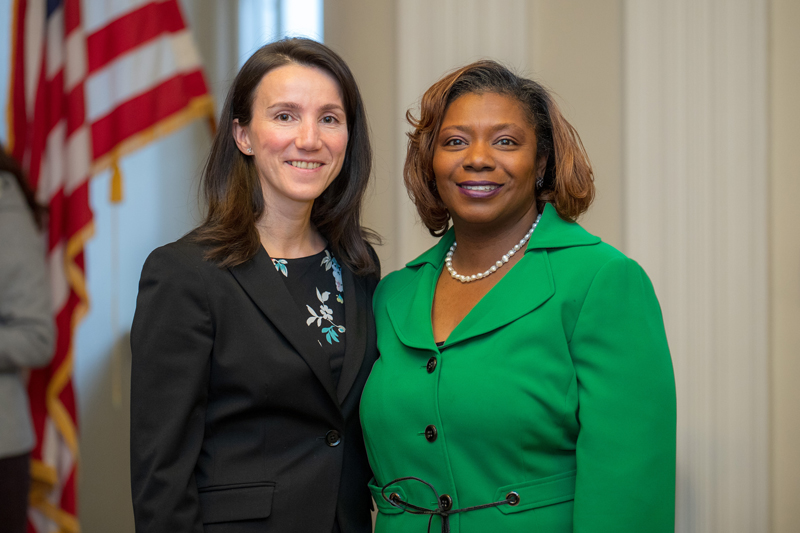


The fight to end segregation is not over
Photo by Kevin Quinlan October 31, 2018
Mary Frances Berry delivers the annual Louis L. Redding Lecture
In the 1954 landmark case, Brown v. Board of Education, the Supreme Court said separate but equal education was inherently unequal. Civil rights activist and educator Mary Frances Berry said despite this, segregation in schools persists today.
“[The belief was] that the good white people in America would do that right thing,” Berry said on Thursday, Oct. 25, when she spoke at the University of Delaware’s Mitchell Hall. “If we win the lawsuit and if we win the case in Brown, then segregation will end…. Well that didn’t happen.”
Berry shared these views during her keynote address at the annual Louis L. Redding Lecture, which honors the late civil rights activist and lawyer from Wilmington. Redding was part of the legal team fighting against segregation in the Brown v. Board of Education case.
UD President Dennis Assanis shared a bit about Redding and his legacy. Redding was the first African-American attorney admitted to the Delaware Bar, where he served as the only non-white member for more than two decades. In 2013, the University dedicated a new residence hall in Redding’s honor.
“The diversity that Mr. Redding helped create continues to increase our community today,” Assanis said. “We often say that the University was founded 275 years ago in 1743. I like to say that the inclusive excellence pillar of UD was actually founded in 1951 [when black students were first admitted to UD because of Redding’s lawsuit against the university], and that’s an important statement. We are grateful for Louis Redding’s vision and hard work.”
As part of the evening, awards were presented to individuals in the community who have made a difference.
Berry, the Geraldine R. Segal Professor of American Social Thought and professor of history at the University of Pennsylvania, has dedicated her life to fighting for civil rights, gender equality and social justice. She served as the chair of the U.S. Commission on Civil Rights from 1993 to 2004. A professor and former chancellor of the University of Colorado Boulder (the first woman to head a major research university), Berry has decades of experience with race and education.
She drew on these experiences to explain the challenges the U.S. education system continues to face. She focused first on K-12 education — the pipeline to colleges — where she said there is overemphasis on standardized testing. She dubbed the U.S. educational system, “standardized test score junkies.”
“Instead of testing people on what we taught them,” she said, “we test them on what we didn’t teach them.”
This obsession disproportionately affects students of color, particularly black and Latino students, she said. As a result, many end up left behind and never make it out of the pipeline to college. She offered that more teachers must be willing to meet students where they are, instead of teaching from where they are expected to be.
Due to the problems in the pipeline, the pool of college students start off with a diversity problem, Berry said. The number of minority students enrolled to earn degrees is a stark difference compared to the overall population.
According to the National Center for Education Statistics, about 13 percent of black students and 18 percent of Hispanic students were enrolled in a degree-granting institution in 2016. Those numbers are 6.9 percent for Asian students, and less than 1 for Native Americans. These numbers are dismal, Berry said.
She noted that the institutional problems obviously extend outside of education. Speaking particularly of the black experience, she said there continues to be danger in everyday activities.
“It’s not just driving while black anymore,” she said. “It’s living while black.”
Although there is still much work to be done and it can often feel like little progress has been made, she said those who won awards that evening are examples of the change-makers society needs. Her message was just do something.
“If we want to make change, continue — all of you that got awards as well as the other people — to do what you can do,” Berry said. “There’s something you can do everyday. When you see something happening, you can do something, whether you do it surreptitiously or whether you do it out in the open.”
Berry examines these issues as well as other movements she’s been part of in her latest book, History Teaches Us to Resist: How Progressive Movements Have Succeeded in Challenging Times.
Honoring Change Makers
During the awards portion of the evening, UD Vice Provost for Diversity Carol Henderson thanked the honorees for their dedication in the fight for civil rights. She borrowed a few words from political leader and activist Nelson Mandela to highlight the impact of the winners.
“There can be no keener revelation of a society’s soul — notes great humanitarian, social activist and former president Nelson Mandela — than the way in which a society treats its children,” Henderson said.
2018 Louis L. Redding Award Winners
Camille Sims-Johnson
Ramona Neunuebel
2018 Recognition of Legends Roll Call
Rep. James Johnson
Sen. Margaret Rose Henry
Raye Jones Avery
Beatrice Ross Coker
Patricia DeLeon
Jane Hovington
Lawrence Livingston
Maria Matos
Jeanne Nutter
Terry Whittaker
Freeman Williams

Contact Us
Have a UDaily story idea?
Contact us at ocm@udel.edu
Members of the press
Contact us at 302-831-NEWS or visit the Media Relations website

